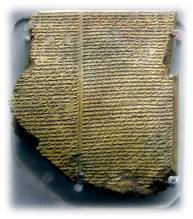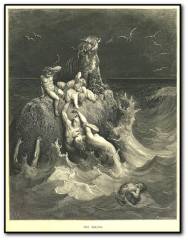 THESE ARE THE DARKEST WORDS EVER WRITTEN, the most tragic truth ever uttered: “The LORD was grieved that he made man on the earth, and his heart was filled with pain. So the LORD said, ‘I will wipe mankind, whom I have created, from the face of the earth.’” (Genesis 6:6-7; NIV).
THESE ARE THE DARKEST WORDS EVER WRITTEN, the most tragic truth ever uttered: “The LORD was grieved that he made man on the earth, and his heart was filled with pain. So the LORD said, ‘I will wipe mankind, whom I have created, from the face of the earth.’” (Genesis 6:6-7; NIV).
There are many other portions of Scripture that are difficult to digest: The deaths of all the Egyptian firstborn; God’s command to the Israelites to destroy entire Canaanite cities; an entire book of the Bible that passes a verdict of ‘meaningless’ on human life; the destructive judgment that falls on mankind in John’s vision of the end of history. They are all difficult to deal with. But this story!—not only of the complete destruction of humanity, but of God’s regret that he ever created us—this story seems to strike at the heart of both our understanding of ourselves and also our vision of God’s goodness and character. What do we do with the story of Noah and the flood?
Of course, skeptics of all sorts will simply dismiss the story as mytholog y; merely the product of a fervent and fevered religious imagination. They point to parallels and resemblances to other such ancient stories, such as the Babylonian Epic of Gilgamesh. There is a flood story here, with an ark, and an ark builder, Utnapishtim. But there are also pointed differences. The ark of the Epic of Gilgamesh is a cube of 120 cubits on each side, and it takes only seven days for Utnapishtim to build it. This is an impossible construction project and an utterly unseaworthy vessel. The ark of Genesis, on the other hand, is well-proportioned for a ship and the Bible implies it took decades to build. But most telling is the fact that diverse and separate cultures all over the world also have flood stories in their ancient tales and legends. From where did these stories all come?
y; merely the product of a fervent and fevered religious imagination. They point to parallels and resemblances to other such ancient stories, such as the Babylonian Epic of Gilgamesh. There is a flood story here, with an ark, and an ark builder, Utnapishtim. But there are also pointed differences. The ark of the Epic of Gilgamesh is a cube of 120 cubits on each side, and it takes only seven days for Utnapishtim to build it. This is an impossible construction project and an utterly unseaworthy vessel. The ark of Genesis, on the other hand, is well-proportioned for a ship and the Bible implies it took decades to build. But most telling is the fact that diverse and separate cultures all over the world also have flood stories in their ancient tales and legends. From where did these stories all come?
A reasonable interpretation of all this is that a rare and dramatic event occurred and has been passed down through the generations. And what is recorded in Genesis is a dramatic yet accurate narrative of this event, because the telling historical details and spare style of the story simply do not read like myth or legend.
 SO LET’S TAKE THE STORY AS TRUE. What then? What does this story say about God and about us, about humanity?
SO LET’S TAKE THE STORY AS TRUE. What then? What does this story say about God and about us, about humanity?
We take it for granted that God is love, as indeed he is. But often our attitude resembles that of Heinrich Heine, a famous nineteenth-century German poet, who is said to have spoken these dying words to a priest who asked if Heine thought God would forgive him: “Of course God will forgive me; that’s His job.” What we have here is a failure to take seriously the full understanding of divine love.
A CENTRAL ASPECT OF GOD’S LOVE IS HIS HOLINESS. The apostle John describes it this way: “God is light; in him there is no darkness at all” (1 Jn. 1:5). Paul tells us that God “lives in unapproachable light” (1 Tim. 6:16). These word pictures remind us of the intensity and brightness of God’s goodness and purity. God only knows, wills, and desires goodness, truth, beauty, and love. There is no darkness in him: no evil motives, no hypocrisy, no tainted desires, no selfishness, no treachery, no deceit, no greed, no cruelty, no arrogance.
God is only and always intense, burning holiness. God in his holiness is also described as a consuming fire. It is out of love that God’s holiness consumes sin and evil. He is unalterably opposed to and will ultimately destroy all that denies or perverts or harms goodness, truth, and love. And he did just that when he destroyed humanity with a flood in the days of Noah: “The LORD saw great man’s wickedness on the earth had become, and that every inclination of the thoughts of his heart was only evil all the time” (Genesis 6:5). And so God in his holiness resolved to destroy humanity with a flood.
I’LL BE HONEST, THIS FRIGHTENS ME. I want it to go away. I want a kinder, gentler God, one who will cut me some slack. And besides, I’m not all that bad anyway, am I?
We humans seldom, if ever, think of ourselves as evil. Not really. Adolph Hitler did not think of himself as evil. I have read several biographies of Hitler, and he was indeed megalomaniacal, even sociopathic. But he thought of himself as the providential savior of Germany and his destruction of the Jews as a necessary good. And that’s about as evil as it gets.
My own crimes and misdemeanors are mostly minor and forgotten. I have never  been arrested. I have murdered no one. I can count the youthful fights I got into on one hand. But if looks, words, or desires could kill, the path of my life would be littered with the dead. Human anger accomplishes no good end, so James the brother of Jesus told us. We want for ourselves, and when we don’t get it, we get mad, or get even. I have lied to loved ones, stolen from friends, cheated on tests and lovers, and betrayed trusts I swore I would keep. I desire comfort and advantage for myself and have often connived to get it. This is not a pathology of self-loathing, I like myself well enough. It’s just the truth. I am a sinner, and in the past I have done evil things. And as I once was, I am sure I would not have made it onto that boat.
been arrested. I have murdered no one. I can count the youthful fights I got into on one hand. But if looks, words, or desires could kill, the path of my life would be littered with the dead. Human anger accomplishes no good end, so James the brother of Jesus told us. We want for ourselves, and when we don’t get it, we get mad, or get even. I have lied to loved ones, stolen from friends, cheated on tests and lovers, and betrayed trusts I swore I would keep. I desire comfort and advantage for myself and have often connived to get it. This is not a pathology of self-loathing, I like myself well enough. It’s just the truth. I am a sinner, and in the past I have done evil things. And as I once was, I am sure I would not have made it onto that boat.
“BUT NOAH FOUND FAVOR IN THE EYES OF THE LORD” (Genesis 6:8). These are some of the most hopeful words ever written. Much has been said about what it means that “Noah was a righteous man” (Genesis 6:9). I take it as simply that Noah wanted God more than anything on earth and was willing to take God at his word. Noah was not perfect, but he was pointed in the right direction. So God in his mercy lent him grace. The story of Noah and the flood is indeed a tragedy, but it is a  tragedy redeemed by grace. There is so much more that I could say that might mitigate the terribleness of this story: God is sovereign over his creation; physical death is not the ultimate punishment; the story is as much about a new beginning as it is a terrible ending. But the lighted center of this story is the light of grace. I may write in the future about why God in his wrath allows that part of humanity who wants no part of God to have what they want, but right now I want to end with grace, especially the grace I myself have received.
tragedy redeemed by grace. There is so much more that I could say that might mitigate the terribleness of this story: God is sovereign over his creation; physical death is not the ultimate punishment; the story is as much about a new beginning as it is a terrible ending. But the lighted center of this story is the light of grace. I may write in the future about why God in his wrath allows that part of humanity who wants no part of God to have what they want, but right now I want to end with grace, especially the grace I myself have received.
